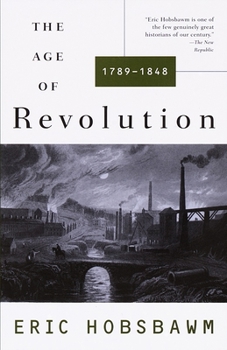Book Overview
This magisterial volume follows the death of ancient traditions, the triumph of new classes, and the emergence of new technologies, sciences, and ideologies, with vast intellectual daring and aphoristic elegance. Part of Eric Hobsbawm's epic four-volume history of the modern world, along with The Age of Capitalism , The Age of Empire , and The Age of Extremes .
Format:Paperback
Language:English
ISBN:0679772537
ISBN13:9780679772538
Release Date:November 1996
Publisher:Vintage
Length:368 Pages
Weight:0.67 lbs.
Dimensions:0.8" x 5.1" x 8.0"
Customer Reviews
5 ratings
A MASTERPIECE
Published by Thriftbooks.com User , 20 years ago
It is quite dificult to find a History book who is well written and also makes you think about the subject. This is the main diference about Hobswamn. He makes you think, and I believe this is the main aim for a Historian. It is curious for me that one of the reviewers complaints about the lack of interest that the author shows for the American revolution. Maybe if we think in the world of XXth century or XXIst one we can consider this situation quite strange, but in the XVIIIth century the new born United States were not important in the world. Besides the influence of the principles of the American constitution cannot be compared with the influence of the French revolution. In the last book of the serie The Age of Catastrophe is when the rol of the United States is more important so he makes a brilliant anylisis of its influence in Contemporary History.This book and the other three are very didactic and I recomend them as a very useful reading for teachers and pupils. Specially as a teacher I think that this book creates a great starting point to begin a debate at class. Even when your class is full of teenagers who ussually think History is a boring matter.
Excellent
Published by Thriftbooks.com User , 21 years ago
The author has, with this book, achived something great. He has managed to write about one of the most complex periods in European and World history in an acurate and detailed manner, whilst keeping it throughly readable. Why past reviews have attacked a lack of mention regarding the American Revolution escapes me. I would suggest that it is the French Revolution that warrents far greater attention due to its profound effects on political systems worldwide, and this book dose just that. For anybody interested in the transformation from absolutist to nationalist Europe, this is a mst read.
Great Laugh and Good Suspense from the UK
Published by Thriftbooks.com User , 22 years ago
I raced through the 500 pages of this book. It was really funny, witty, and quite a good look into current pop-culture in the UK. Brookmyre the author is able to make you laugh out loud. If you are looking for something that will tell you about life in the UK in an interesting and funny manner this is your book. Read it -- it's just good!
The rise of modern civil society
Published by Thriftbooks.com User , 22 years ago
Hobsbawm is a prominent historian. This is the first volume of trilogy which covers from 1789 to 1914 of Europe. The first volume is about how the modern civil society emerged in Europe through dual revolution. Modern civil society emerged took shape with French revolution and Industrial revolution. While in England, civil society rose only through industrial revolution, nation-states in continent were shaped with dual revolution. Dual revolution eradicated ancient regimes and caused the great socioeconomic earthquake. The period this volume covers was mired in the influence of its impact. The author illustrates a convincing picture of that age: what were the impacts on society, economy, thoughts, religion, sciences, and arts; how the modern civil society was completed. But that kind of subjects has been widely tackled. Then why another book on the mountain of paper? The advantage of the trilogy lies in its way of depiction. The author persuasively shows that the history is not only about institutions, or economy, but also about human drama: how the people lived through their time. Moreover, the trilogy was written not for colleague scholars but for layperson. It¡¯s easy and fun to read. But, no doubt, it doesn¡¯t mean that it lacks depth: the aim of the book, the author said, is not description but interpretation. In that way, the book was endowed with coherence as meaningful entity. It¡¯s the virtue that is hard to achieve in scholarly writing intended to be read by other scholars.
Hobsbawm enlightens about an enlightening age
Published by Thriftbooks.com User , 26 years ago
Though it was originally published in 1962, Eric Hobsbawm's The Age of Revolution still can be considered one of the most astute and authoritative analyses of the French and Industrial Revolutions. Through his recognition that these two revolutions were linked through various historical circumstances Hobsbawm illuminates the period that began with the rise of Jacobinism and ended with the failure of the 1848 uprisings. Unfortunately, Hobsbawm's work in not accesible to the novice historian. The reader must possess at least a casual knowledge of the French and Industrial Revolutions to adequetely comprehend Hobsbawm's conclusions. Additionally, some readers might rebuke Hobsbawm for his at times awkward phrasing. Of course, most historians struggle severely with writing as a result of the monumental difficulties inherent in the endeavor of trying to record through language the essence of a historical period. Consequently, Hobsbawm should be forgiven if a few of his sentences require re-reading. Irrespective of the simply technical, however, the Age of Revolution suggests why Hobsbawm is considered to be one of the great modern historians. Certainly, some readers are critical of Hobsbawm for his Marxist tendancies, but these crtics generally are serving their instinctual prejudices rather than maintaining an adherence to objective reasoning. Hobsbawm possesses a mind that shuns simple conclusions in favor of complex answers that raise even more complex questions.





